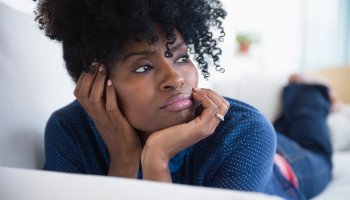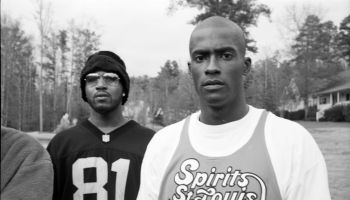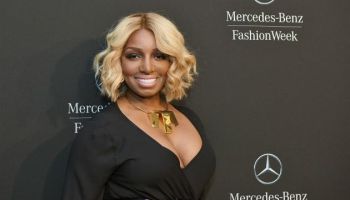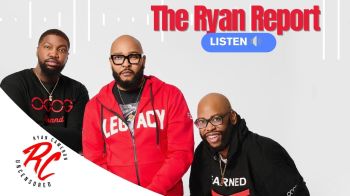There’s a longing—central to women with darker hues.
In a world based on euro-centric features and values, darker-skinned women are undermined, hyper-sexualized, misunderstood, and at times, dismissed. For most, we struggle with the label of “other.”
Above describes the plight of most minority women, but as a woman of deep melanin, I believe there are specific differences that checkered my experience. Let me say this is not meant to be exclusionary to other Black women, or women of color—we’re all conjoined by the joy, pain, and gratification of existing in a body filled with melanin. But just like the human experience, the Black experience is layered, and such is the breakdown of Blackness and womanhood.
There are surface encounters like when someone says, “You’re pretty for a dark-skinned girl.” There are covert messages, like noticing the absence of your skin tone in beauty ads, commercials and TV shows. The relative or close friend who says they wish to marry lighter in order to afford their children with “better features and good hair.” It’s there when a man at a bar points out your “blatantly African features,” but fawns over a friend who he claims looks more, “European.”
But in spite of all these things, as I take inventory of myself, this is the conclusion I’ve come to: I will no longer be a weepy, wide-eyed, dark-skinned Black girl.
I came to this decision because of self-preservation and sanity. As a writer and journalist, my occupation relies on getting to the truth. But after living in my body for the past thirty-one years I realized I was holding onto notions, the idea that I was not enough. For most of my formative years, I’ve felt diminished by outsiders and those who share the experience of walking the world as Black. The word I kept coming back to was “inadequate.”
Growing up, I was surrounded by loving parents and positive reinforcement. However, the world outside of my safe space got to me. Peers at my West Covina, California school repeatedly told me that I was not enough. “Your lips are too big,” “Your nose is too wide,” “Your hair is too nappy.” But the phrase that cut the most: “YOU are ugly.”
Every part of their criticism had to do with my features which was directly linked to my Blackness. My nose, my mouth, my eyes, my skin, my hair texture—all derived from my ancestry. I did my best to block out the noise, but within the fortress of my heart and soul were deep cracks that allowed the poison to seep in.
I attributed it to the fact that there’s something about my Blackness that disturbed and distorted their perception of me, like an uninviting barrier. I also considered that maybe my skin that spoke to a deep pain within those still struggling to love themselves.
The journey to this willful dismissal of “less-than” first began in 2014 when Lupita Nyong’o bared emotion in front of her peers at Essence’s Black Women in Hollywood luncheon, when she explained why she could no longer indulge in the “seduction of inadequacy.” In plain terms, people who struggle with low-self esteem, or warped self-image, have the tendency to use their pain as a crutch to remain stagnant.
N’yong’o’s confession that she used her self-loathing as an armor of validation struck me. I tucked away N’yong’o’s words to address at a later time.
But like any type of lethal mixture, the soot always finds its way to the top. It wasn’t until my colleague Keyaira Kelly jokingly said, “I don’t feel like being a crying, dark-skinned Black girl today,” that my inner voice yelled “checkmate.” I laughed too, but felt deep emotion about the thing I was not ready to face.
I realize now that this is my moment. I look around and I am doing exactly what I said I was going to do. I am a writer, living in New York who has the position and platform to share my experience because there’s another skinny, knobby-kneed, Black girl who needs to hear this. I’ve been looking at myself differently, no longer inadequate, but morphing.
Every goal that I set in my life was met and marked with completion. I have my health, a loving support system–a fortress in an unforgiving world. The path was necessary, but because of it I recognize my humanity and the beauty of my Blackness. Instead of viewing it as a mark of shame, I feel more empowered, more emboldened to love myself—without limitations. I plan to take back my power and will resist leaving it within the confines of people, places and spaces that lie outside of my range of control. Everything that I placed value in had to do with my exterior, and that was difficult to face.
Who would I be not to relish in the lineage of my bloodline? The markings of kings and queens lie within me and I am ready to honor them by stepping into my freedom.
RELATED LINKS:
Debunking The Biggest Myths About Mental Health In The Black Community
Black Women Cradle Our Men And The World, But Who Is Holding Us?
On Aramis Ayala And Black Women Who Refuse To Cower In The Face Of Oppression
Why I’m No Longer Embracing The Weepy, Dark-Skinned Girl Narrative was originally published on hellobeautiful.com














